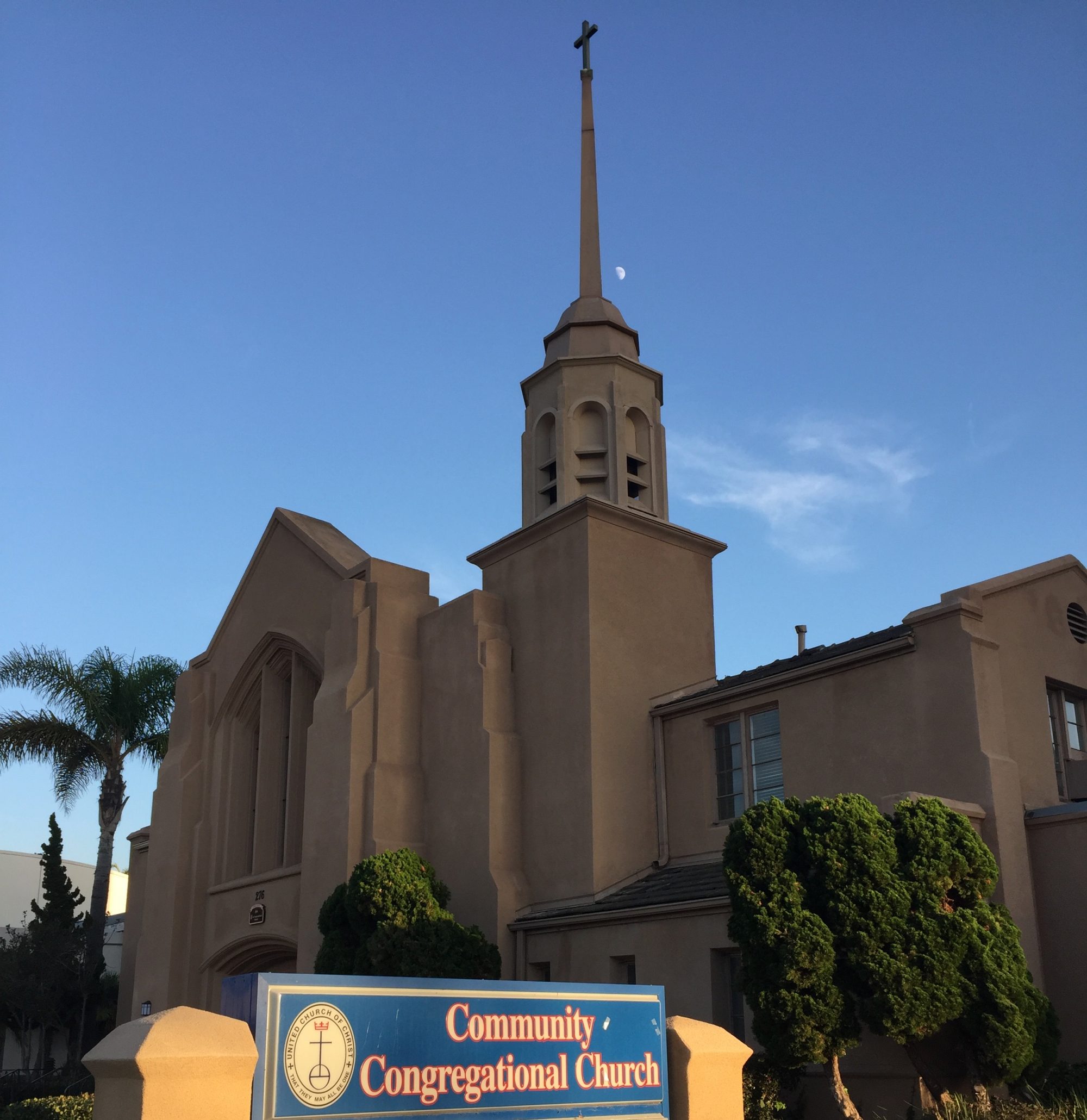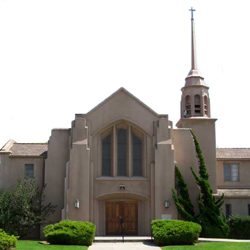Reflection – March 25, 2020
Reflection by Pastor Liz Aguilar
Worship – March 22, 2020
https://www.facebook.com/chulavistaUCC/videos/643545133146744/
Homily Given on March 22, 2020
Originally shared via Facebook Live Stream
Scripture Text is John 9:1-12
Rev. Liz Aguilar
Community Congregational Church of Chula Vista UCC
The scripture reading is one of the many stories about Jesus’s miraculous healing. On the surface that is what it is about. But it’s also about some other important things. As this is the season of Lent it is customary for the Christian church to focus on reading scriptures that depict events leading up to Jesus’ crucifixion and resurrection.
Context: there was this blindman walking about. The disciples notice this blind man and ask Jesus what sin Jesus thinks the man must have committed to have been born blind. Jesus doesn’t spend time focusing on their question. Rather, Jesus he focuses on what the work is to be done. (Verses 4-5) In other words- Jesus was saying, “while I’m around, I must do the work that is at hand.” Jesus then proceeds to cure the man.
Afterwards, people then begin to speculate who it is and how it is that the man who had been blind can now see. (In other words, they continue to focus on the wrong thing.)
This tells me and cautions me NOT to waste time focusing on the wrong thing. We can focus speculating why this happened. Some have wasted time accusing others of having lived sinful lives and that somehow this is a punishment from God. BUT GOD DOES NOT WANT TO HARM US. If we can learn something from the hardship we face, then so be it. But let us not waist time speculating on the who and the why.
Instead, let us be of service- helping one another as much as we can; a phone call, a grocery drop off; a card in the mail, a kind text, an email, praying for one another (I covet your prayers), living peacefully with those with whom you live, forgiving one another, being kind to one another, not keeping score, not wasting time on petty matters.
I have an example of a recent event when a group of people decided to not waist time but instead came together in order to help people in need of food. This last Friday I was so humbled to be serving with a large group of mostly millennials who worked hard for several hours packing groceries in bags and then giving them to the many people who drove up in cars at Community Through Hope. (CTH) is the only social service agency that is dedicated to needs of unsheltered people in Chula Vista and it holds the only operating food bank (besides San Diego’s) in all of South Bay. (South Bay comprises all the cities south of San Diego). This was the first day of our new “shelter in place order” and stores were already running out of food. CTH volunteers had already been giving food out all week every morning. On Friday the number of cars that drove up, doubled in size.
Another way that our church decided not to waste time was to form a new “care team.” The care team made phone calls to all of our members and friends on our roster in order to see if everyone had what they needed and also prayed with some of you. If anyone needed anything they then gave those list of items to the other part of the group (called runners) who then made the drop offs to people’s homes. I am grateful that we know that this is indeed not the time to speculate as to the why and the how but instead we have mobilized into action so that we may be of spiritual and practical support to one another. Therefore, we know it is time to organize and serve others. Jesus was here and came to teach us how to serve others. Let us be His servants but serving our fellow brothers and sisters. Let US be His hands and feet!
I end by reading from one of my favorite theologians, Henri Nouwen. I’m reading a portion of his chapter on “Community” from one of his books that is a compilation of his writings. It’s called, “The only Necessary Thing.” To follow Christ means to relate to each other with the mind of Christ; that is, to relate to each other as Christ did to us- in servanthood and humility. Discipleship is walking together on the same path. While still living wholly in this world, we have discovered each other as fellow travelers on the same path and have formed a new community. Compassion then can never be separated from community. Compassion always reveals itself in communion in a new way of being together. It is in the Christian community that we offer it a compassionate response. For when people come together in Christ’s name, he is present as the compassionate Lord (Matthew 18:20). Jesus Christ himself is and remains the most radical manifestation of God’s compassion.” (The Only Necessary Thing, Henri Nowen., Wendy Wilson Greer, editor. Crossroad Publishing Company. New York, NY. 1999)
Worship – March 14, 2020
March 14, 2020
Church Closed through end of March
Dear Brothers and Sisters in Christ,
It is out of an abundance of love and care for our church family and partners in ministry that we have come to the conclusion that it is indeed necessary for our church to suspend all worship services and close down the church facilities effective immediately. We will review this decision at the beginning of April to determine a further course of action. Thank you to our Church Council members who have helped Mike Bishop (church moderator) and me, to make this decision.
We now share this letter with you to give you more information as to why we needed to make this decision. Also, it contains important information as to how we will be moving forward, in light of these unusual times.
Firstly, it was in response to the official advice from the CDC, and our own denomination that we took this step. Our denominational leadership has sent out “strong suggestions” to all church clergy that worship not be conducted beginning this Sunday. Our national gatherings and meetings have all been cancelled.
Personally, my first concern is your well-being: spiritually, physically and mentally. I took my ordination vows very seriously, 22 years ago, which is when I agreed to indeed care for the well-being of those to whom God has entrusted me. Please know that I will remain available to you and our church family for pastoral care concerns.
I realize that it feels very counter-intuitive for us not to be in community and in worship, together, because as Christians we love to pray for and just be with each other. This is very hard. However, the decisions that our government has taken in order to protect us, dictates at this time, that we must be wise and take every precaution necessary with wisdom and calm.
I have just now been in communication with church staff. Amber will be coming in as needed in order to continue the administrative duties of the church and Pelito will also come in so that our office area and bathrooms remain disinfected as best as possible. I have asked that Pastors Victoria and Jamall be in touch with their groups on a regular basis in order to minister to them as best as they can using phones.
Moving forward, on Sundays and on Wednesdays I will be sharing a short reflection, prayer, and scripture via facebook live. People do not need to have a facebook account in order to watch. They simply need to go to our church’s face book page and click on “watch.” I will be doing this at 9:30 a.m. on Sundays (starting Sunday, March 22) and at 7 p.m. on Wednesdays (starting THIS Wednesday.) The web address to our facebook page is m.facebook.com/chulavistaucc or simply type in community congregational church of Chula Vista facebook in your browser and you will be directed to our facebook page.
This unusual situation will be pushing us to do ministry in very creative and effective ways. I ask that all of you remain in touch with one another and always with the goal to edify and encourage one another.
Additionally, I will be sending out reflections and short prayers on a weekly basis via email. I know however, that not all members have email capability. So we will need to send some devotional materials weekly, by regular mail.
I will also be asking members of our visitation ministry along with Victoria, Jamall and myself to call all members as needed, to be in contact with them, for spiritual support. We do not want anyone to feel isolated during this unprecedented time.
For now, I share with you this verse from Paul’s letter to the Philippians 4:4-6. “Do not worry about anything, but in everything by prayer and supplication with thanksgiving let your requests be known to God. And the peace of Christ which surpasses your all understanding will guard your hearts and your minds in Christ Jesus.” Amen.
In Christ’s service, Pastor Liz
Worship – March 8, 2020 “The Power of Prayer”
The Power of Prayer (Sermon notes)
March 8, 2020
Scripture texts are Jeremiah 29:12; Romans 8:26-27
Rev. Liz Aguilar
Community Congregational Church of Chula Vista, UCC
We continue our sermon series on the 6 marks of discipleship. Do we remember what those “marks are?” Prayer, reading scripture, worship, service, giving, spiritual friendships.
Last Sunday I gave an over-view of those 6 marks and we spoke about why they are all important. Today I wish to share more about prayer.
Prayer is the primary way we communicate with God and God communicates with us. Quiet ourselves, it helps to find a same place to go to in your home for daily reflection with God.
Some prayers are quick and desperate, some are longer.
We must begin with the premise that God wants to me in relationship with us. In biblical history God and people spoke to each other all of the time. Later when Jesus came along the disciples asked him how they should pray, which is when Jesus gave them the words of the Lord’s Prayer. Unfortunately, that has become so rote that we do not always pay attention to those words. I encourage you to do so…
But we must acknowledge that there are times when we do not know how to pray. There is so much on our minds and hearts. Fortunately, the Apostle Paul knew this and wrote “Sometimes we do not know how we out to pray but the spirit intercedes with sighs (groans) too deep for words”
God wants to hear from us and God needs us to pray for one another. God CAN do anything God wants but for some reason God wants us to intercede for one another in prayer.
Back to not knowing where to start- There is an old “formula” sort to speak which has helped me when I have not known where to start my prayers. The acronym is ACTS. Acclamation, Confession, Thanks, Supplication.
(Describe each)
But sometimes we don’t know why we are led to pray for someone but we must answer in obedience. I knew a young woman who was very active in one of my churches I served. She was struggling but I did not know any specifics. I felt compelled to pray for her and so I did on my own and with her dad, who was my colleague and boss at the time. We prayed together and asked God to help her in any way she needed it. The next day, much to my surprise, I learned that she had cleaned her room and had re-enlisted in college courses! This experience taught me that prayer does work and that if someone comes to mind our job is to pray for them.
I have also discovered that the more you pray the more you want to pray. The more you allow God to lead you to pray for others the more the Holy Spirit will lead you to do so. These days there is no shortage of reasons to pray and although God can do anything God wants to do God calls us to indeed pray for one another.
Amen.


